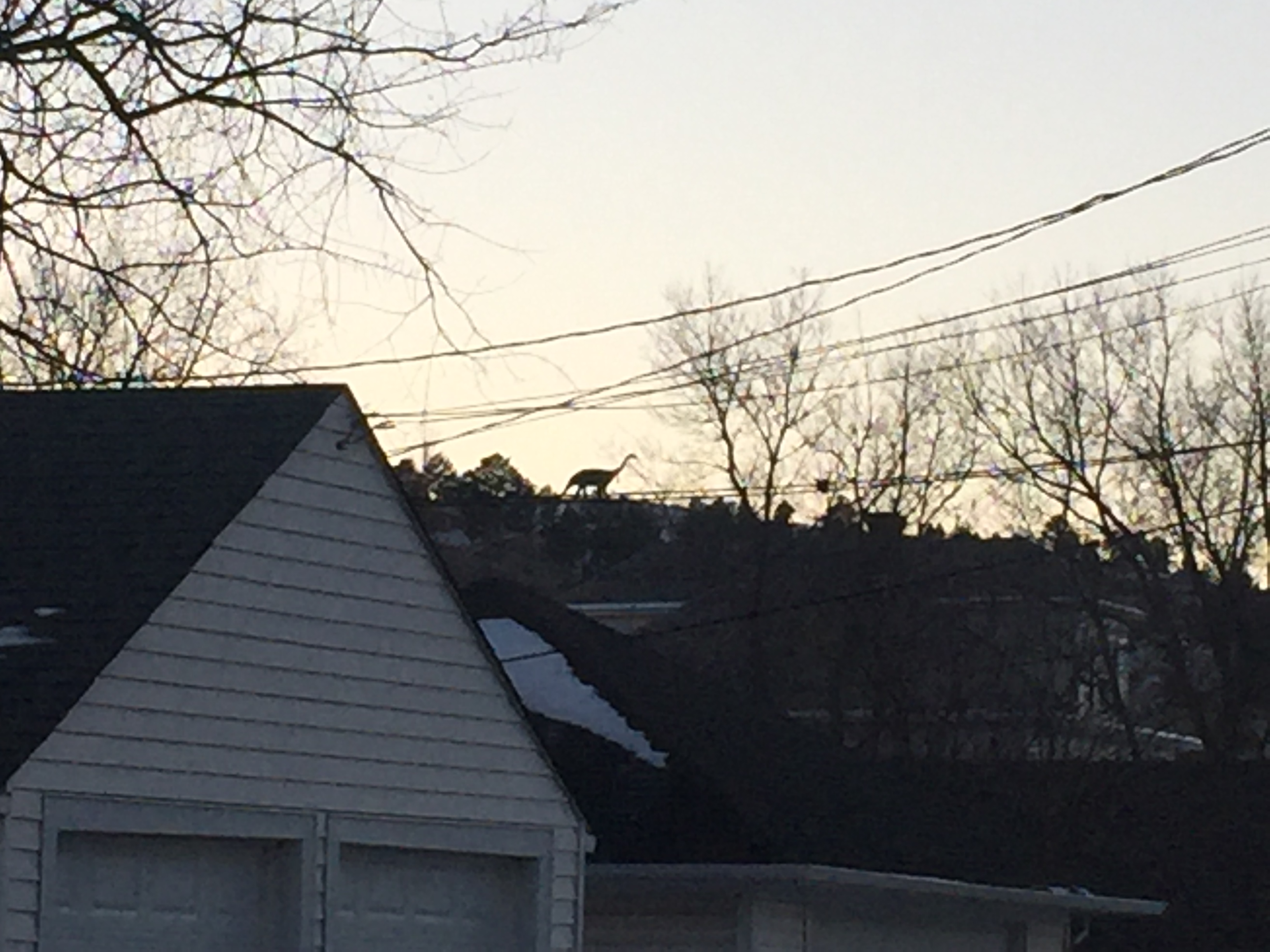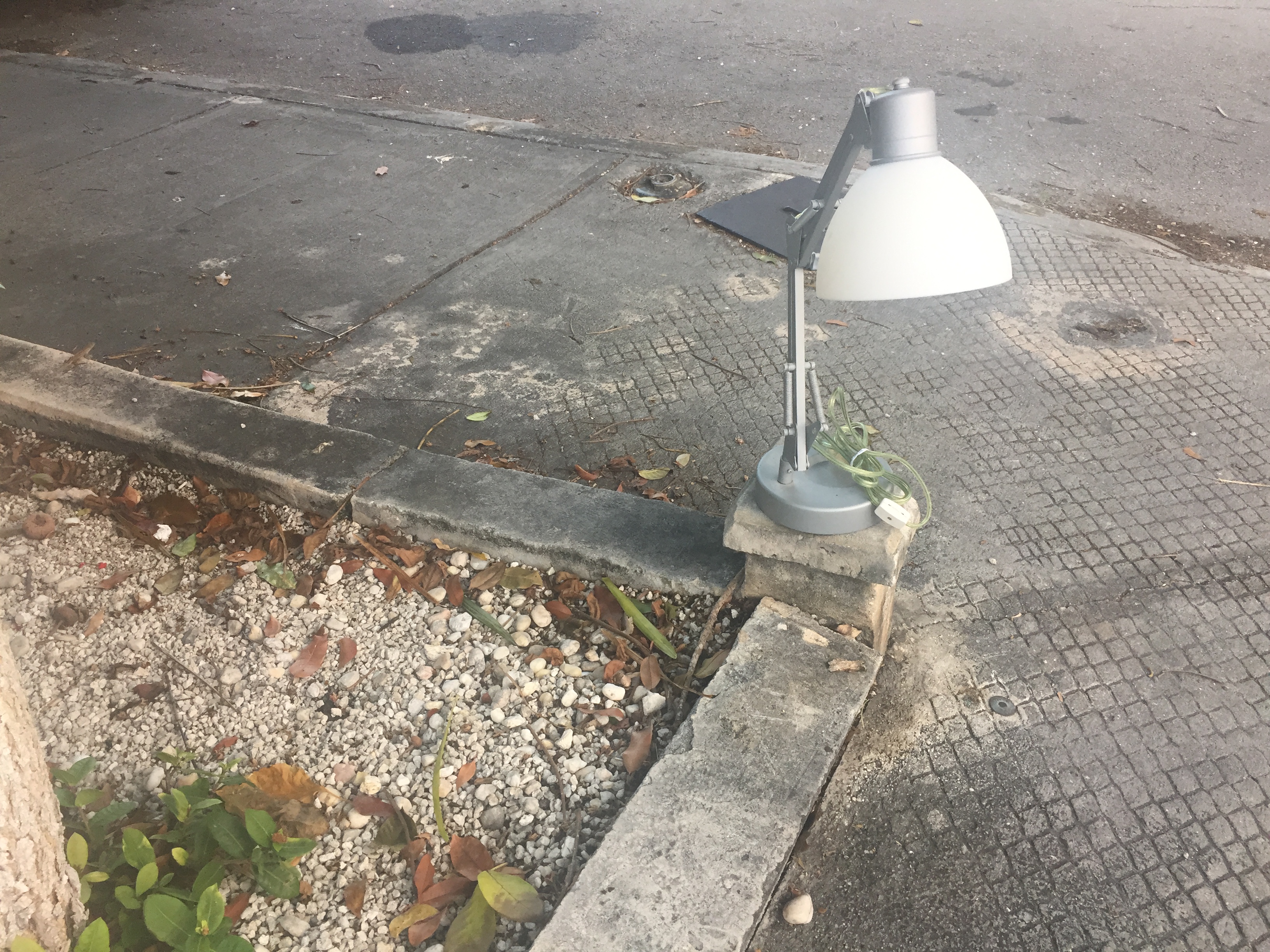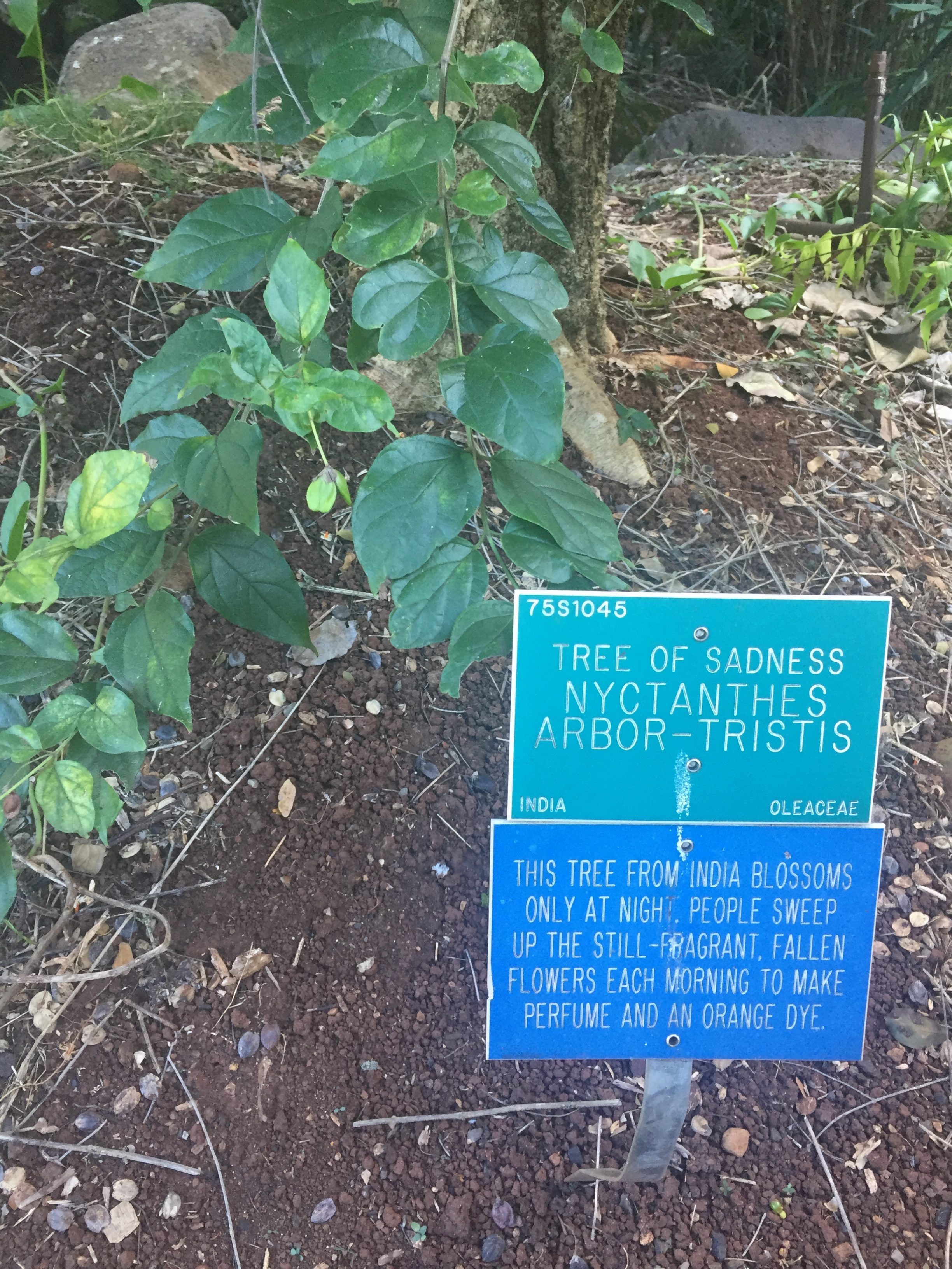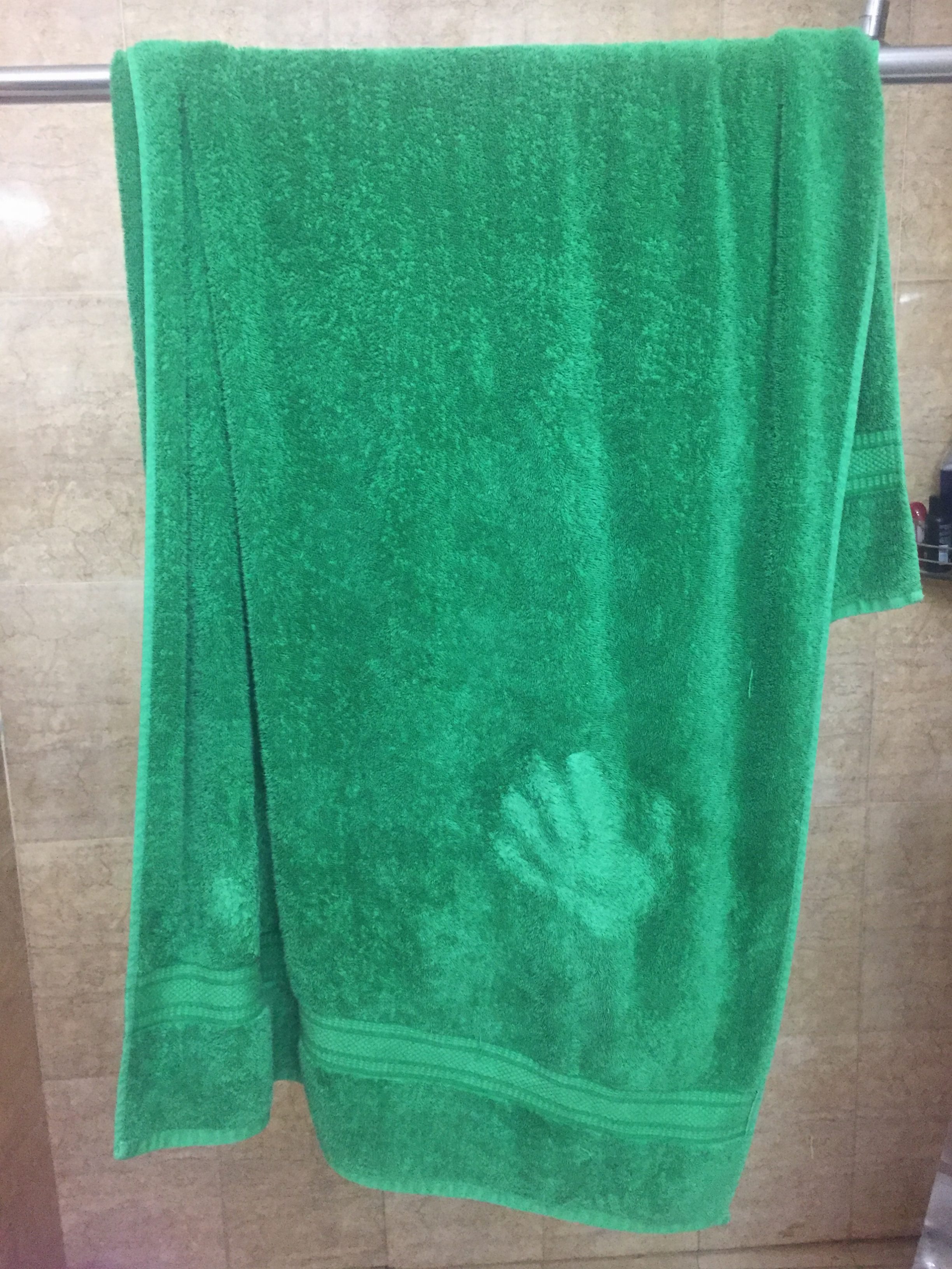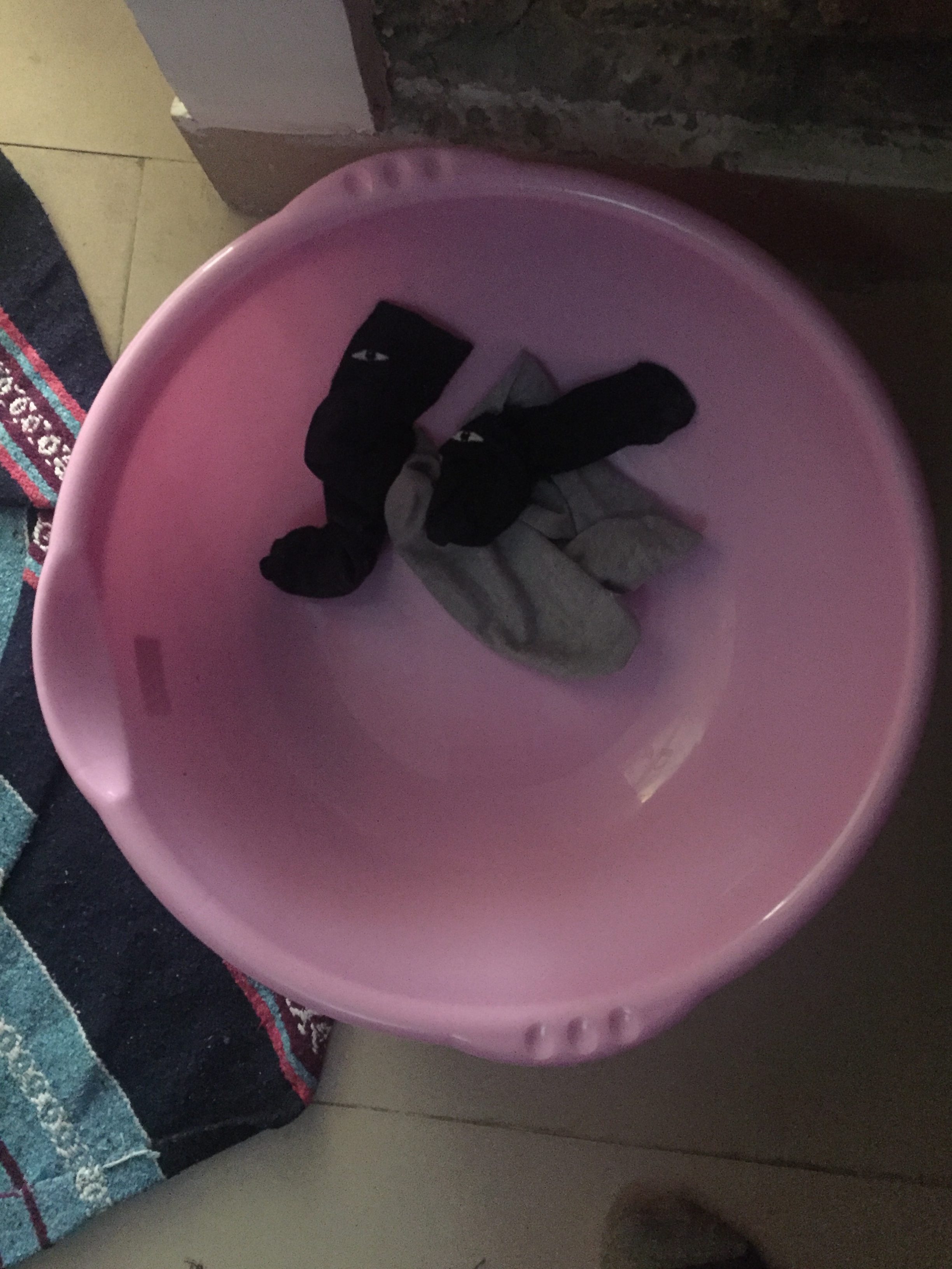
“Goshdarnit, I thought we had this worked out!”
The gathered crowd shifts uncomfortably as the park ranger, a man withered by his thirties, wrings his hat in frustration.
“Come’on darlin’!” he coaxes the ground, “Come’on up!”
The ranger’s neck is blushing red and he keeps his back to us, his face turned away. From the side, it’s possible to see he’s wearing a stiff smile. He checks his watch very carefully. He pulls out his phone and checks the time there, too.
“Funny thing,” he says, “Certain things you can predict and certain things you just can’t but it’ll be any second now…”
Nothing happens.
“Here’s a trick that used to work,” the ranger says, “On the count of three, we yell ‘BOOM’! That’ll get a reaction! Ready? One… two… three!”
“BOOM!” we say.
But, still, nothing happens.
“Ha ha…” the man tries to laugh, “One more time: A-one and a-two and a-three!”
The crowd responds in a mutter, embarrassed for the man.
“Any moment…” he says.
We wait in an uncomfortable, almost mocking, silence. There is no wind and branches hang still. Birds do not sing. Even the monstrous children cling quietly to their parents.
“Whatcha’ doing over there, Brian?” another ranger calls from the forest, suddenly, “Old Miss giving you trouble?”
“It’s fine, Alana!” our ranger calls, gesturing her away, “All under control here.”
“She’s a feisty one! Let me have a look…”
“I’ve been doing this for years, Alana, I don’t need…”
“BOOM!” Alana shouts, jogging over, and her exclamation is nearly drowned out by the thick jet of water that explodes out of the ground in front of us.
Most of the tour group is too distracted to see that our guide is twisting his hat between his fingers again, even as Alana pats him jovially on the back. I wonder, for a moment, if he’ll hit her- he seems like a man with few straws left to break. Brian hangs his head, instead.
‘‘Ol’ Unfaithful’ is nature at the height of cruelty, a magnificent geyser that promises nothing. It celebrated its status as a National Park in 1981 with a decade of dormancy, followed by the scalding-fatality of a ranger in the spring of 1992. There is no predicting its pattern of eruptions, no seismic tell to be perceived by machines. It adheres to timetables one week and scorns them the next. It rumbles enticingly for hours before releasing dry, sulphurous, flatulence. It’s said to have sprayed mud, acid, and satanic prayers at different points in history. It’s said to have swallowed a schoolchild.
‘Ol’ Unfaithful’s’ only constant is perversity, and even that seems to move along a spectrum between playfully antagonistic, and outright murderous. Arrive with little expectation, reader, and keep some distance.’
-traveler
The stranger’s truck is old and its cab is small, made smaller by garbage and stained fabric and wet places. The stranger drinks coffee from a plastic thermos that he carefully balances on a broken, fold-out cup holder. It explains a lot about the condition of the upholstery and illustrates a thing I had suspected about him- that he is no more enlightened than I am. A man that understands the meaning of the path would surely just fix…
To be honest, I don’t know if it means anything.
I watched the stranger argue with a cashier over that mug, insisting that he should be able to fill it for a 25-cent discount, that ‘Gas & Drive’ is one of many branches to recognize said discount. When I offered the stranger a quarter to end the dispute, he took it. The argument was not about the principle of the thing, as I had suspected. It was about the quarter.
The stranger may have no principles. He may have left the witch hunter to die if I had not insisted on dragging her to the lawn of the burning cottage. He may have pulled pennies from the bowl on the counter of the ‘Gas & Drive’ to make up the cost of his bitter, yellowish coffee. He may not be enlightened at all or these features may simply persist with enlightenment. It would be dangerous to conflate moving ahead with betterment, to assume knowledge is preferable to ignorance.
For example:
When I was young, my brothers and I realized there was a great, concrete manhole in our backyard. It had always been there, at the edge of our property where the forest bunched up against the delineating fence, but we lived for years before taking any sort of notice. We had not yet entered the middling age, when dreams become relegated to the nighttime, so we dreamt for a full 48 hours of what might lie beneath the mundane grass of our yard before our parents had left on some short errand. We knew, instinctively, that they would not approve of our journey into the earth.
Our combined strength was not enough to lift the great cement plug so we improvised a lever from a fallen branch and see-sawed the skinny weight of three boys with the secret door. It lifted and fell back into place several times before a lucky shift left it ajar- a 6-inch view of the darkness beyond. We summoned our courage and turned a flashlight on the mystery.
Shit.
A 3-foot drop into a lake of our own shit. We had discovered the septic tank.
Could it be that I ignored the lesson of that afternoon? Will it be a lake of shit, on a grander scale, that greets me at the end of this path? Perhaps, facing something like that, one comes to understand the value of a quarter and the relative cheapness of human life.
‘A Guide to America’s Shitholes:’ the book I would write if I had it in me to write a book. A series of disappointing investigations stemming from the first, the literal, hole of shit.
‘Young Americans go abroad to discover themselves and pull over the car to discover each other, adding lover’s lanes to the folk infrastructure of our nation. They are skittish locales, disappearing even as the sticky label of ‘lover’s lane’ is applied. These dark strips of road are at their peak when they are just a place, a place where people go to… you know… do… things. How often a well-meaning initiate-’
“How many times are you going to read that?” the stranger grumbles, “You don’t think I know how to find a place? Didn’t I find you?”
“You didn’t use the book to find me,” I tell him, “What do you care that I read it a few times?”
He breathes slowly, exhaling from his nose. He leans over to the windshield and breathes on that- wet huffs that blossom on the glass and fade.
He leans back and takes his coffee again: “I don’t know how much longer I want to wait.”
“The author says these places are fleeting.”
“All the more reason to call it a night.”
But:
‘The intimate darkness of ‘44th between Alder and Oak’ is unusually long-lived, a stain that refuses to come out in the wash. It is said, in a truth disguised as a joke, that couples parked here will be visited by a thing, by a judge, that reveals the lovers’ potential with a handprint on the windshield, raised fingers counting toward a positive outlook. What’s to keep a crafty partner from planting a handprint while their beau is indisposed? The legend is very clear about this point: the true judge on ‘44th between Adler and Oak’ will only ever mark the outside of the glass.’
“This is the most childish thing…” he says, shaking his head, “When I was in middle school we would twist the stems of apples and chant the alphabet until it broke off. I always made sure to take it easy on mine until ‘L’ came around.”
“And?”
“Luke never came around like ‘L’ did.” The stranger coughs- a persistent, rumbling cough neither of us have spoken about, “What did they do at your richy-rich school?”
“We-” something clicks on the back window and I squint into the darkness there, finding nothing, “We would just talk to each other, man. We would just talk to each other and fuck.”
“In middle school?”
“High school, then. We talked to each other. No need for magic apples.”
The stranger shifts and stretches: “Maybe it’s just nobody was twisting their apples with an eye for you.”
“Maybe.”
“Let’s go,” he says, “Cops think it’s all good and fine when it’s teens hanging out in these places but two adult men…”
“You don’t think there’s anything here?”
“I think if there’s anything here, it’s chill enough to leave be,” the stranger pulls a cheap pair of binoculars to his face and laughs, “Ah, look at this.”
He points out his window at a car parked down the block and, leaning over the stranger’s legs, I see that the windows there have fogged over. A hoodied figure has peeled away from the darkness of a tree and carefully approaches the car.
“Mystery solved,” the stranger says, taking the binoculars back as the kid presses his hand to the glass, “Looks like every town’s got their magic-”
Something slaps our windshield suddenly and the glass shatters into webs. The stranger is out of the truck immediately, yelling at a thing that is already gone, waving a pistol I did not know he had. In my stupor, I see the fading imprint of a palm and a single, raised finger: the pointer.
A rating of one, a gesture for silence, or for warning.
The stranger is, undoubtedly, more trouble than he is worth. I pocket a quarter from the dash and determine to part ways with him at the next obvious juncture.
-traveler
‘(sponsored content)
‘A Place for Followers of the Gray Witch, Roki,’ is, admittedly, a venue with limited appeal but, for followers of the Gray Witch, Roki, it is certainly a must-see. It is difficult for the author, as somebody who does not subscribe to the teachings of nor follow the Gray Witch, Roki, to describe exactly how ‘A Place for Followers of the Gray Witch, Roki’ is appealing to its audience, per se, but, if you’re a follower of the Gray Witch, Roki, and you enjoy seclusion and forested locales, then it is likely a place for you.
Card-carrying members of the followers of the Gray Witch, Roki, (and, here, the author remains unsure as to whether actual membership cards exist or if it is simply a turn of phrase) are granted free access to ‘A Place for Followers of the Gray Witch, Roki,’ though space is quite limited and all potential visitors are asked to call ahead in order to arrange accommodations. The owners ask that followers of the Gray Witch, Roki arrive in groups no larger than three.
(sponsored content)’
“Ah ha!” an old woman screams, leaping out from behind a graceful sycamore and stabbing me in the shoulder with what looks to be a ceremonial dagger of some sort.
“What?!” I scream back, before lapsing into comfortable unconsciousness.
When I wake I find myself tied to a chair in a dimly lit room that smells like dust and caramel. A short burst of static draws my attention to the gray-green lump of my backpack on the floor to my left. My shoulder aches under a bandage.
“Hello?” I ask and then, lowering my voice to a whisper, “Radio-person, can you hear me?”
The bag spews another second or so of static but offers nothing further. I wonder if my radio understands enough about me to know I would rather not deal with the police, or if it knows enough about this situation to call them anyway. I wonder, maybe for the first time, how much it knows about me at all.
I shake in the chair, to see if anything about my bindings will come lose, but several bells tied into the rope behind me ring out and I hear footsteps approaching the door. The woman steps into the room, smaller and frailer than I remember from the stabbing. She wears an apron and yellow, rubber gloves, neither of which suggest a particularly positive outcome to this situation.
“Found yourself cut off from Roki, have you?” the woman asks, “Must have something to do with these…”
She points to the ceiling, to the cryptic posters tacked to it. They seem to be a hodgepodge collection of runes and occult symbols, though some simply have the name ‘Roki’ written and crossed out in thick, red ink.
“I’ve been at this for some time, young man, do not underestimate my cunning.”
She pauses and I try to think of something to say that won’t get me stabbed again.
“Curious,” she continues, “Have you no hexes for me? No curses to spit in my face?”
“I…”
“Ha!” she yells, tearing off her apron to reveal a tangled collection of amulets and talismans hanging loosely about her chest, “I bet my life you have no magic so powerful as to…”
“I’m not…”
“Not a follower of the Gray Witch, Roki, eh?” she asks, “Think I haven’t heard that one before? And how did you find this place, exactly?”
“The…”
“The book!” she cries, “The advertisement! The bait to my little trap. Tell me, oh innocent tourist, what about ‘A Place for Followers of the Gray Witch, Roki’ appealed to you? That advertisement was carefully crafted to appeal only to followers of the Gray Witch, Roki which means a follower of the Gray Witch, Roki you must be!”
“Who…”
“My sisters and I have devoted our lives to hunting followers of the Gray Witch, Roki. Patricia hunts the strongest, Clare hunts the most clever, Eliza hunts the most faithful, and I hunt… the rest…”
She pauses so that I can respond.
“You must get a lot of guys like me, then.”
“Much like you, yes,” she says, “And now, we… what?”
“I didn’t…”
“What are you doing?” she screeches, cupping her hands over her ears, “How have you… the talismans! Stop this!”
I shuffle the chair back as she stumbles forward and draws the dagger from her waistband. She screams again and presses her arms to her head.
“Stop!” she cries, “I surrender, I-”
The woman collapses onto the floor, the dagger skittering across the linoleum to my feet. It is very quiet, for a moment, and in that quiet I am eventually able to make out a subtle, whine.
“Traveler,” the voice on the radio startles me, “I’ve done something cruel to the woman’s hearing-aides.”
“Thanks,” I say, trying to scoop up the dagger with my bound feet.
“Wait,” it says, and it sounds as though it may be struggling to suppress a chuckle, “I also made a call.”
The door opens behind me again and I smell… smoke.
-traveler
‘Visible for miles around, the ‘Eye in the Sky’ is a vestigial component of the region’s old fire alert system. No single part of the hike is difficult, but the trek is complicated by a system of ridges that make for an extended approach. Reaching the ‘Eye in the Sky’ and returning is difficult in a day- most literature recommends spending the night and waking for the sunrise.
Most literature also includes a caveat- that campers should not come alone.
A little research reveals a series of scattered incidents at the site, usually an unpleasant run-in between a family and a crazy- never the same family, never the same crazy. The crazies range in age and background but few have a history of erratic behavior. They claim, unanimously, that the ‘Eye in the Sky’ is to blame for their brief, psychotic break but are, also unanimously, unable to explain how.’
The author does not say whether he reaches the ‘Eye in the Sky’ alone and he does not say whether he spends the night. Can I trust that he would warn me of danger, as he did at the rest stop so many months ago? Is the passage, as written, warning enough?
The hike is hard for me, but, then, I am carrying everything I own on my back and, also, I am terribly out of shape. I think of the stranger often as I follow the path. It’s a narrow thing, occasionally muddled by overgrowth or a fallen tree but never unclear. There are no signs past the trailhead, only the sure footfalls of those who came before me.
It is nearly night when the tower rises ahead of me on the hillside. I find a soft place in the ground and build my camp there. I am on the lookout for crazies early in the process- the author does not always offer a full warning in cases like this, but his printed word is often to the point. If he’s willing to spare a few sentences to mention trouble at a site, it’s likely worth my time to consider it.
My ratty tent manifests and swallows my bag as the last gray strands of twilight pull away. I find my flashlight and start toward the tower, now a dark silhouette marking the invisible precipice beyond.
I am not the only one spending the night, here. I spot a couple’s tent near the base of the ‘Eye in the Sky’ and a family huddled around a small, illegal campfire. I sense their eyes on me and I know they, too, have heard rumors of this place’s particular dangers. I try to look unimposing and, in doing so, trip on the stairs to the base of the tower. Could be that helps my case- could be it makes me look drunk.
The inside of the ‘Eye in the Sky’ contains the cigarette butts and broken bottles necessary of a place like this, but the refuse keeps to a corner and moonlight leaking in from several barred windows is enough to climb the stairs by. There is no guard rail, no qualifying sign regarding the risks of ascending the tower. Places like this are becoming rare- they sit on budgetary back-burners until some idiot manages to break their neck and sue. Places like this are being made safe, given time.
The view from the top of the ‘Eye in the Sky’ is staggering. Little midwestern towns twinkle and smoke in the darkness below, separated by the vast, dark forest that winds its way up this hill, up to the very base of the tower. As is often the case when faced with stars, I am struck by an uncomfortable sense of oneness, a feeling that sinks in my stomach and pools in the soles of my tired feet. It is terribly quiet as I try to understand my place in a world that sprawls out of sight in all directions.
I am turning away when movement draws my attention to the woods. A figure moves along a path toward the base of the tower, not the common path, the path I walked in on, but a separate, almost invisible path. A path that is made visible only by following the thing that walks it.
The figure is fast and it walks carelessly. It is pale and dressed in light clothes, appearing to glow under the moonlight, a roving oblong speck, ecstatic in the darkness. It is a long ways a way, but its strange march fills me with a fear that is quite unlike the dread oneness from before. This is a fear that pricks like needles in my hands and my back. I scratch nervously at the tower wall and watch- the thing is still quite far and there is plenty of time for it to turn another way, or to reveal itself to be something less fearful than I imagine.
But it does neither.
The thing does not become comfortingly clear in its approach, but remains stuttering and fast and vague. I find myself inching away from the window without realizing, stepping forward again when I nearly lose sight of it. At times, I think I see waving arms, as though it is engaged in some sort of strange dance. Other times I see a head, lolling on a limp neck. Each time I try to focus on a feature, it gives way to another, though I come away with the sure afterimage of a human figure and a feeling like a high-pitched noise. It is undoubtedly coming here, to this place, from wherever it was before.
I step to the other side of the tower and look down at the family’s little fire, at their forms huddled around it. Further along I see the couple’s tent, lit from the inside by a lantern. I rush back, expecting the strange thing to have vanished but see that it has only grown closer, that its troubling movements have grown wilder. It seems like it could be skipping now, that its legs skip while the rest of its body hangs loosely.
This is no drunk, it is no normal person or thing. I am thankful for the relatively few times in my life that I have looked upon something and been sure of its malevolence but this is one of those times. The prancing white figure means harm- some buried instinct, some ancestral fear tells me this is the case and it is all I can do to think of the others as I begin to flee.
I am hardly out the front of the tower, having nearly become the inevitable broken-necked idiot on the stairs, before I shout out a warning to the campers:
“Something’s coming this way! We all need to get out! It’s almost here!”
The father of the family reacts immediately, he dives into their tent as I gesture toward the path of the thing, the thing that remains out of sight. The man reemerges with a baseball bat and the child screams:
“It’s a crazy man!”
I planned to run anyway.
-traveler
“This is the Taffy Well,” our guide says, “I’m sure you can imagine it takes quite a bit more power to pump taffy up through those pipes than, say, water or anything like that. We have to get the pump engines special-made from partners in Germany.”
Below us, on the factory floor, a series of pipes shake and twist. One segment seems to consist entirely of thick rubber tubes, expanding and contracting cartoonishly. Steam bellows out of the machine at 30 second intervals and the engine powering it roars endlessly.
I raise my had and people groan.
“Yes, sir? Another question?”
“Yeah, sorry. Where is the taffy coming from?”
“I didn’t catch that, sir.”
“You said you’re pumping the taffy ‘up,’” I shout over the machine, “Where are you pumping it up from?”
“Oh, from underground,” he says, “The next room…”
“Underground where?” I ask, ignoring several glances, “From storage or something? It’s not actually like a well, is it?”
“I can’t hear you, sir. Let me get back to that in the next room.”
I glance down at the squirming pump again and see a factory worker frantically moving between the pipes with a stethoscope-like tool. After several stops the woman leaps back and seems to radio in several other employees, all of whom approach the spot cautiously and take turns with their own stethoscopes. They gesture wildly to each other, their words lost in the noise of the engine.
“Sir!” the guide is signaling from the door, “We’ll need to move on!”
‘‘Schulz Taffy’ is an American standard, a candy that is unbound by region. It is the universal bottom-shelf treat, boasting several vague flavors at a quarter-a-piece or five-for-a-dollar. Few people would claim ‘Schulz’ as a favorite. Fewer still would recall ever buying it. ‘Schulz Taffy’ is a candy made for sitting in bowls at reception desks. It sinks to the bottom of trick-or-treat bags, consumed as an afterthought in late November.
In September of 2008, ‘Schulz’ drew media attention for adding a sixth, ‘mystery flavor’ to their traditional five. Contrary to similar marketing tactics, the company apparently did not plan to reveal the basis of the new flavor at any point and grew defensive when customers reached out with guesses via social media. ‘Schulz’s’ CEO would later remind the digital masses that the company, at no point in the past, had ever named the first five flavors and that, for reasons unknown, seemed to comfort the dubious customers. Many questions remain regarding ‘Schulz’ as a company and a product but, considering the nature of this book, the most relevant is, perhaps, why would a company like ‘Schulz Taffy,’ with such a keen interest in secrecy, offer free, factory tours?’
The next room is much quieter and the catwalk is encased in glass. The floor below is nearly empty, an absurd amount of space for what appears to be a single machine. A pipe leads from the south wall and enters a cube, maybe 6’ tall and shining, obsidian black. Another pipe leaves the machine and enters the north wall. Neither could be more than a few inches wide.
“This is where we filter out the impurities,” the guide says and he checks his watch. “The next room is real treat…”
“What?” I ask.
“Sir?”
“What impurities? And all the taffy runs through there? What is that thing?”
I point to the cube and see the pipes now run from east to west. The north and south walls show no signs of ever once having a fixture.
“Did anybody see that move?” I ask. I try a chuckle to ease the atmosphere. “I could have sworn those pipes moved east to west a second ago.”
“The filter was designed to use gravity to its advantage,” the guide says, “It means ‘Schulz’ consumes less power, and provides for a greener world.”
The cube is now suspended in the air by pipes running from the ceiling and draining into the floor. I watch it carefully for several seconds.
“Sir,” the guide says, “I’d ask that you not touch the glass.”
“I’m not-”
“Shall we continue?”
Our guide leads us down a hallway and through several swinging doors. We pile into an elevator and, as we ascend, he hands out ‘Schulz’ branded ear plugs.
“Things are going to get noisy again here in a moment,” he says, “Don’t be alarmed!”
Finally, as the elevator door opens, I see my own concerns reflected in the faces of those around me.
“The process of pulling the taffy,” our guide yells, “releases a variety of gases from hidden air pockets. It’s funny, what people say they hear in the noises- bird calls, whistling-”
“Screaming,” I say, “It’s screaming.”
A great wad of taffy is suspended in the room, pulled and folded by thick, rotating arms. The air is warm and thick with sugar and screaming.
“Screaming, huh?” the guide says, uncomfortably, “That’s a new one…”
“Surely not,” I insist, “That doesn’t sound like birds- it sounds like screaming. Like people screaming. Doesn’t it sound like screaming?”
One of the children on the tour cautiously nods and I point to it as a sort of confirmation.
“I could see how a person unused to screaming might think that,” the guide calls, “But I wouldn’t personally draw comparisons between the two sounds.”
The screaming is interrupted for a few seconds by a series of hoarse coughs but quickly picks up again.
“See?” the guide says.
“See what?” I yell, losing my temper, “It coughed and started screaming again.”
“It’s taffy, sir,” the man explains, “It can’t cough or scream.”
“Normally I would agree with you,” I say, “Taken out of context I can see how I would be the crazy one, here but given we’re standing in a room full of screaming taffy-”
The screaming stops, suddenly, as the machine finishes its cycles and plops the monstrous taffy into a vat. A lid lowers to seal the candy inside and the machine begins to piece it out onto a conveyer belt that leads through a window into another room.
“Sir!” our guide exclaims as I dig my ear plugs out, “Sir you must keep those in for safety!”
Without the plugs I can hear the taffy’s muffled screaming from inside the vat. I shake my head and gesture to the others to follow suit and they look nervously between us.
“It’s still screaming in there!” I shout.
“Please, everyone, this man is clearly upset. Do not remove your ear plugs until we are safely-”
“I feel fine!” I yell, “There’s no noise but the screaming in the machine!”
Several employees are now looking up at the catwalk, alerted to my outrage. Several more man the conveyer belt and inspect the taffy pieces with stethoscopes.
“Are those pieces screaming too?” I yell, “Is that what you’re listening for?”
A short time later I am escorted off the ‘Schulz Taffy’ grounds and asked not to return. The radio crackles as I mount the bike. It has been silent for a long time.
“Something bothering you, traveler?”
“I feel like shit.”
“Sick, again? Your pockets are empty…”
“How would you know?” I ask, pulling away under the eyes of ‘Schulz’ security.
“Heh, heh,” the radio laughs, “Heh, heh, heh…”
-traveler
Rear View Mirror
- September 2025
- August 2025
- July 2025
- June 2025
- May 2025
- April 2025
- March 2025
- February 2025
- January 2025
- December 2024
- November 2024
- October 2024
- September 2024
- August 2024
- July 2024
- June 2024
- May 2024
- April 2024
- March 2024
- February 2024
- January 2024
- December 2023
- November 2023
- October 2023
- September 2023
- August 2023
- July 2023
- June 2023
- May 2023
- April 2023
- March 2023
- February 2023
- January 2023
- December 2022
- November 2022
- October 2022
- September 2022
- August 2022
- July 2022
- June 2022
- May 2022
- April 2022
- March 2022
- February 2022
- January 2022
- December 2021
- November 2021
- October 2021
- September 2021
- August 2021
- July 2021
- June 2021
- May 2021
- April 2021
- March 2021
- February 2021
- January 2021
- December 2020
- November 2020
- October 2020
- September 2020
- August 2020
- July 2020
- June 2020
- May 2020
- April 2020
- March 2020
- February 2020
- January 2020
- December 2019
- November 2019
- October 2019
- September 2019
- August 2019
- July 2019
- June 2019
- May 2019
- April 2019
- March 2019
- February 2019
- January 2019
- December 2018
- November 2018
- October 2018
- September 2018
- August 2018
- July 2018
- June 2018
- May 2018
- April 2018
- March 2018
- February 2018
- January 2018
- December 2017
- November 2017
- October 2017
- September 2017
- August 2017
- July 2017
- June 2017
- May 2017
- April 2017
- March 2017
- February 2017
- January 2017
- December 2016
- November 2016
- October 2016
- September 2016
- August 2016

